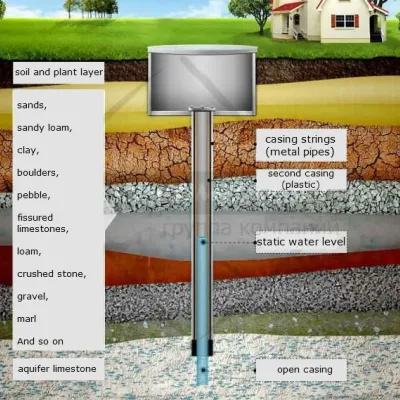Based on the Energy Forum's report on energy consumption in homes, the most energy is consumed in heating and cooling. The report says that modern homes consume 35% more power compared to three decades ago. Therefore, energy efficiency is currently becoming the most relevant topic, which is expected to be achieved through new technologies. However, energy consumption per household is still limited, regardless of the many electronic devices and electrical appliances in our homes. Other studies have also shown that the use of energy-efficient devices has led to lower energy consumption in homes and a relatively low carbon footprint.
The future of heating systems can be bright if homeowners continue to use energy-efficient systems and gadgets. Intelligent technologies in homes have also improved energy efficiency, as heaters can be connected to the Internet to provide real-time information, allowing homeowners to control energy use. The proposed wireless sensors for automated heating and cooling control systems will provide access to information such as outdoor weather conditions at a relatively low cost. New protocols are also being developed by various federal agencies to improve communication between smart devices and systems.
The most energy-efficient heating systems
The most effective heating system would be one that can be extracted from what is always at hand and in sufficient quantities. If people learned to extract energy directly from any matter, then the material could be, for example, sand and water. Either one or the other is almost everywhere and at any time of the day, and then one could receive as much energy as needed without storage and loss systems. But for now, we can only dream of it, and we, living in a cold climate, have to use available energy sources, such as oil, gas, firewood, or coal, which produce energy through the chemical reaction of combustion. Chemical sources of energy are the oldest and most widely used on the whole earth. Fortunately, in Russia, there is a lot of all this. One drawback is that an amount sufficient for the entire population is too far away, and besides wood and waste, it is usually deep.
Wood heating
Wood can be an efficient source of energy for heating if there is access to unlimited wood materials. However, this heating source could jeopardize global forest cover if everyone relies on wood for heating. If there is plenty of wood in your area, it can be a good heat source. It is worth noting that wood can only be effective if you have an efficient wood-burning stove or fireplace that can burn cleanly. Besides, the throttle should be closed if you are not burning wood to prevent the loss of heated air through the chimney. Modern fireplaces and wood-burning fire chambers are produced with a coefficient of performance (Efficiency) of up to 93%, only they need to be regularly fed with dry firewood. Unfortunately, it has not yet been possible to automate loading a fireplace or stove with firewood. But pellet boilers can be automated, and they work on sawdust or vegetable husk; Pellets are very convenient to use, especially if they are made in your area.
The following common heating source is natural gas.
Natural gas
For heating, gas is convenient in that it can be delivered through pipes. But to carry out so many lines throughout a country to each house is almost impossible. In terms of investment, it is an expensive fuel. Unlike electrical networks, the initial investment for connecting to gas is relatively high. The cost of connection starts from $ 5000 depending on the area of residence, while the calorific value of gas differs significantly in different networks coming from various fields. In one village, a liter of water boils in 15 minutes, and in another in 30, and it is pretty challenging to check the quality of gas. Therefore, gas is not always cheap. But gas is convenient for heating, heating water, and cooking. Gas boilers can be connected to the Smart Home system to control the air temperature in the house and heat the water. But if you hope for gas heating, you will have to choose a place of residence, which means you will not be free and will be forced to live in densely built-up settlements with all the ensuing consequences: noise, gas pollution, and the like.
Diesel
Because oil is cheap to obtain, there is a problem when it comes to storage. You need an oil storage tank, not to mention the health and environmental risks of oil storage. It generates an unpleasant odor coming from an oil tank or stove. Also, at present, insurers do not want to provide living quarters with oil storage tanks. Another problem is filling up the tank, which is considered an inconvenience for most homeowners.
Solar heating
This is the most energy-efficient heating system for the home, based on renewable energy, a contribution to environmental protection, and financial costs. Only the correct orientation of the house to the cardinal points, increasing the surface area illuminated by the sun, can save up to 25% of resources. This is the cheapest way to install and operate, as the user does not need to purchase specific equipment. Once the house is designed so that sunlight can be received and converted into thermal energy, you already get heat. Sunlight passes through windows that face the sun, so that heat can be retained by airtight and well-insulated walls and floors. There is no maintenance cost after installation since solar energy is "free" unless there is cloud cover. In this case, another heat source will be needed.
Geothermal heating sources
This is another effective source of heat for homes, as it also uses the sun's energy accumulated by the earth's crust. It is an environmentally friendly heat source that uses an evaporator system to remove heat similar to a refrigerator. Of course, you will need to use a certain amount of electricity, diesel, or coal, but this leads to a reduction in gas emissions. This is one of the best ways to save on heating costs, although the installation process is usually expensive. Not all homeowners can find funds for upfront costs.
Electric heaters
This is the most expensive heating source if you do not live in areas where prices are subsidized by the state. The only effective and clean methods for generating electricity are hydropower and geothermal energy, in which water and steam are used, respectively, to rotate turbines. This reduces production costs and low carbon emissions. But often, coal is used to generate electricity, and this is no longer pure energy. The river on which the hydroelectric power station is built flows more slowly and thereby violates the ecological balance for aquatic animals, fish, and plants. Besides, the generated energy is not stored, and if consumers do not use power, it is lost.
Another most powerful source of heat - the Sun - is ineffective in winter. Let's look at what opportunities we have to heat our house and get the hot water we need in the summer.
The Sun is not always and not everywhere, and although solar energy is absolutely free, devices for processing and storage are still quite expensive. Fortunately, their price is reduced annually. Earth's own heat or geothermal energy can easily be generated in limited places of the earth, where the earth's magma comes close to the surface. But this is also a fat minus since in these places, there is usually high seismic activity. Wind energy, which is also based on solar power, is unpredictable and, in many areas, not strong enough winds to hope for high efficiency.
Gravity energy is another long-used energy source, but it also requires considerable costs for converting kinetic energy first into electromagnetic and then into heat. Hydroelectric power plants cannot be built everywhere, and their construction leads to environmental degradation. Nuclear energy is by far one of the cheapest sources. But due to public concern about the risk of explosion and storage of radioactive waste, this energy has gained a bad reputation.
Energy efficiency depends on the ease of receipt, delivery to the consumer, and the ease of storage. And if the ordinary consumer cannot influence the first two points, then the latter is quiet. Therefore, measures are being taken around the world to reduce energy consumption in homes. Therefore, before choosing a heating system, think over the insulation system at home.
The best heating system should insulate and seal the house so that the heat does not leave the house. Secondly, it is essential to ensure that the energy source is as cost-effective and low carbon as possible. Assuming that every homeowner understands the importance of insulation and sealing, we will discuss the most effective heating options for the home.
Heat pumps
The ongoing production of next-generation heat pumps can increase heating efficiency. These heat pump systems will heat and cool, distributing heat from one room to another. Some of these systems include fuel systems that can minimize energy consumption by about 30%, heat pumps using natural gas with low carbon emissions, and low-cost gas heat pumps designed to reduce heating costs by about 40%.



